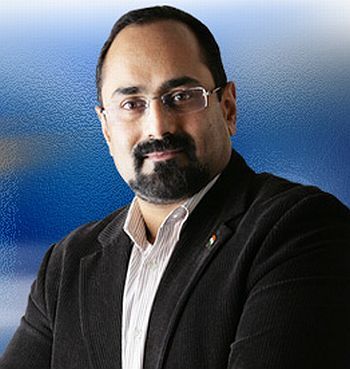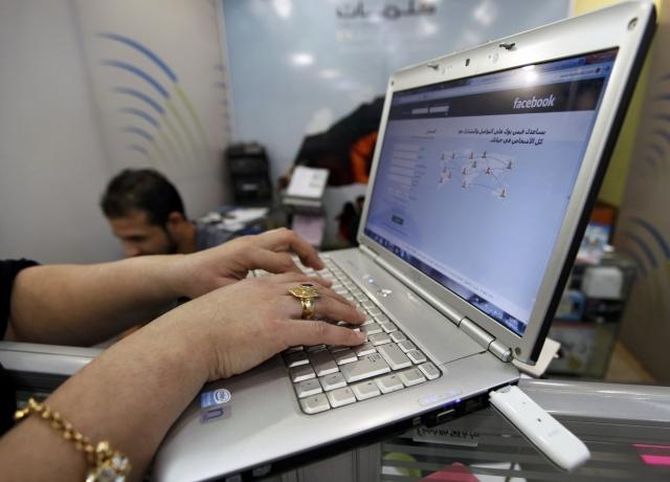'What the Supreme Court decision does is encourage more and more young Indians to get involved in citizenship and democracy and do so more fearlessly.'
'Obviously, this is not a licence to be rude or go defaming people or be obnoxious online or do illegal activities online.'
'But this is a licence and green light for people to get more involved in the country, its politics and governance, its businesses, and be freely expressing your views on it.'
Rajeev Chandrasekhar -- Independent Rajya Sabha member, technology entrepreneur and key petitioner along with others in the Public Interest Litigation against Section 66A of the Information Technology Act 2000 -- on what the repealing of the law means for India 200 million online users.
Independent Member of Parliament in the Rajya Sabha Rajeev Chandrasekhar was one of the key petitioners in the Public Interest Litigation in the Supreme Court seeking the scrapping of Section 66A of the Information Technology Act.
He has hailed the repeal of the controversial law as a victory of freedom of expression and also a victory for India's younger generation.
Chandrasekhar, left, below, answered Saisuresh Sivaswamy/Rediff.com's questions over e-mail.
It is very unusual for a serving MP to file a PIL in the Supreme Court. How did you come about that you were a key petitioner challenging Section 66A of the Information Technology Act?
When a MP like me exhausts all his options, which is to speak in Parliament, take it up with the government, approach the prime minister and the minister concerned, and the government fails to respond and fails to do the right thing, I was left with no recourse.
Then you do what is the last resort left for most citizens, which is approach the Supreme Court and file a PIL.
This is not the first time that I have had to use this approach. I have in the past as well done it for securing voting rights for the armed forces.
It has now become a pattern that the Supreme Court is increasingly becoming the place of last resort to get the right things done.
This is effectively a factor contributing to the decline in the credibility of Parliament and the government as institutions.
How did such a badly worded legislation like Section 66A get passed in Parliament?
The fact that we got a piece of badly drafted legislation that couldn't stand legal scrutiny goes back to how legislative processes have in a sense declined in our country. This bill was passed in 2008, in a din in Parliament, in seven minutes flat.
I know this for a fact because I had prepared for over two days to have a debate on this, and I had stepped out of Parliament to have a glass of water.
The bill was supposed to be introduced and a debate was supposed to commence, but when I walked back in, I heard that the bill had been passed!
When you pass a bill like that, when you force it through, the consequence is you don't have a debate and you are not going to have a scrutiny and a pushback from the legislature and the media that is required to make it a better legislation.
So you invariably get a legislation like the IT Act that we have today -- full of holes, full of potential abuse, full of vague areas and replete with ambiguity and huge amounts of administrative discretion.
This is why we had to fight this for the last five years, why we finally it took the Supreme Court to intervene and say this is unconstitutional.
The Bharatiya Janata Party and the Congress had joined hands to pass this legislation. Now they are at the forefront welcoming this ruling. What are your views on that?
I would be careful about characterising this as a BJP supported section in the bill. Let's leave it aside because I don't know if there is any evidence for that. Anyway, I don't hold a brief for them, but what is clearly ironical and laughable is for Kapil Sibal or P Chidambaram to now say they support and welcome the repeal.
The question that must be posed is what were you doing for the last four years when you had an opportunity to do the right thing?
I think if anybody has to be congratulated, it is the judges and the people who stood by this fight for freedom of expression.
Most of the conventional political class have grown up on a habit of intimidation and lack of criticism. Now suddenly we have 150 million, 200 million Indians who are online who have the ability to criticise, ability to access, ability to challenge them.
This is a brave new world and a brand new world. The politicians are not adapting to it. Those who are not adapting are pushing back, trying to continue the old model of intimidating those with original thought.
 Is there a downside to the repeal of Section 66A?
Is there a downside to the repeal of Section 66A?
There is an upside and there will be a downside if the government does not do what this repeal tells them it should do. The repeal and this verdict suggest to the government is that this bill is dated.
So the message really to the government is, please go out and create a contemporaneous law, a modern law that addresses both the objectives, preserve the Article 19(1) guarantee of free speech, and if there is anything that you want to do vis-a-vis Article 19(2), make sure that it passes the test, that it really is a proven criminalisable offence.
Does this verdict affect the right to privacy vis-a-vis celebrities?
Privacy is a different issue as in India there is no privacy law today, and there is a genuine, urgent need for a debate about legislation that covers that aspect.
Whether it is privacy relating to your information in Aadhar, privacy relating to your tax information, whatever, there is a major vacuum in our criminal law and code in terms of protecting, giving, the individual rights to privacy.
Especially in contexts where government tends to become big brothers and are intrusive in the name of terrorism and go into areas where they have no business going. That is a separate issue and needs to be addressed.
Now whether the two will come together, I don't really see the logic for it, I think the right to privacy should be a standalone law on the statute book for which already debate has started, I have pushed for that for the last few months and years, so that is a separate issue.
How can we create an overall review of the Criminal Penal Code?
About the other existing legal provisions that can still be used to browbeat freedom of expression, we are now asking for a complete overhaul of our criminal system.
There are laws in our statute books today, in our Criminal Penal Code, that are criminally open to misuse, that are used for extortion and blackmail.
That is a larger discussion about how do you create an overall review of our Criminal Penal Code to make sure that it is much more balanced and basic principle of innocent till proven guilty is consistent through our statute books.
The Internet has grown in leaps and bounds in India. In today's scenario, how does the government go about bringing about regulations in this space?
I am from the school of thought that regulation, when the word is used, can only be for a narrow space of misuse of the Internet. The government can never regulate the Internet, and should never get into the business of regulating it, should never get into the function of it.
They are incapable, they won't even know where to start and where to end.
The only area where the government has a legitimate role is to protect the innocent from the misuse and abuse of the Internet, whether it is cyber bullying or pornography or drugs or inciting communal hatred or whatever.
I think the word 'regulation' must be very carefully used only in the context of regulating against the misuse of the Internet and regulating it only to protect the vast majority from a small group of criminals, not the other way round that Section 66A was trying to do.
What the Supreme Court decision does is encourage more and more young Indians to get involved in citizenship and democracy and do so more fearlessly.
Obviously, this is not a licence to be rude or go defaming people or be obnoxious online or do illegal activities online.
But this is a licence and green light for people to get more involved in the country, its politics and governance, its businesses, and be freely expressing your views on it.
The decision is good for the next generation of India.











